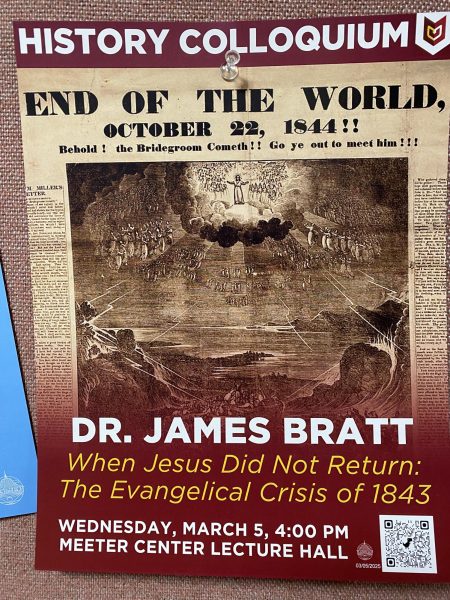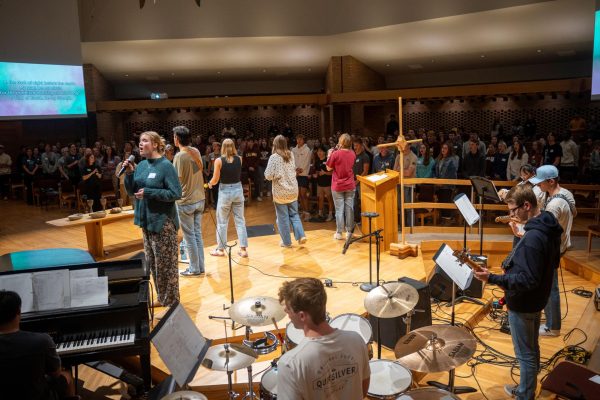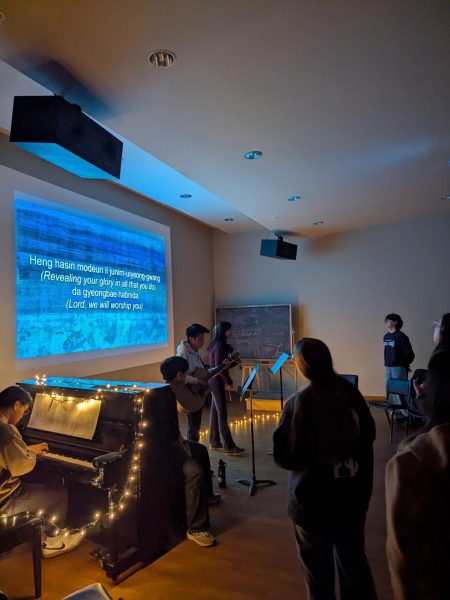Atheist organization meets regularly at Schuler Books
About a mile away from Calvin, a group of 20–30 atheists and non-religious people meet every other Sunday in the back of Schuler Books at 11 a.m. to discuss major topics in atheism and their personal experiences living as non-religious people.
The group is the Michigan branch of The Center for Inquiry (CFI), and they have been meeting at Schuler Books on Sundays since the organization was first established in 1997. According to their website, CFI is a nonprofit organization composed of “freethinkers, atheists, humanists and nonbelievers who question and challenge the extraordinary claims of religion, pseudoscience and the paranormal.”
The branch that meets at Schuler Books began as the Freethought Association of West Michigan but in 2007 reached out to the CFI headquarters, eventually becoming the CFI West Michigan Branch.
According to the Executive Director, Jennifer Beahan, one of the goals of CFI is to create that type of “social support network for the unchurched.” Beahan was also careful to emphasize that CFI does not attempt any “evangelistic atheism.”
“We do not try to convert people.” Beahan said. “We’re trying to raise awareness that there is a community for unchurched people.”
CFI is also affiliated with Kaufman Interfaith Institute, housed at Grand Valley State University, which is an organization that the Service Learning Center of Calvin College has been involved in for the past several years.
Manato Jansen, interfaith coordinator at the Service Learning Center and interfaith intern at the Kaufman Institute, has devoted a great deal of time to providing support groups for students who are religious minorities at Calvin. Jansen commented that the populations of religious minorities might surprise most Calvin students. “We have a much more religiously diverse community than we might think,” Jansen said.
Jansen specifically mentioned that the number of students that classify as non-religious seems to be much larger than one would expect from a Christian college. He also said that students who identify as non-religious are “the people within the community that feel the least welcome to share their beliefs.”
Negative treatment by religious people and institutions is also an issue relevant to members of CFI Michigan. Beahan noted that one of the challenges that the members of CFI face is that they feel isolated. When members have “come out of the closet” as atheists to their religious families, some of them are shunned or treated harshly.
Beahan said that it was important for Calvin students to be aware of the prevalence of non-religious people in their generation. “A quarter of people in your age group are atheists, and chances are you know one.”
Beahan suggested that Calvin students should “go out and find out what a real person believes.” She also offered CFI as a resource for questioning students.
Jansen agreed with Beahan’s advice to students but gave it a spin of his own. “The first step to truly loving your neighbor is knowing what they believe,” Jansen said, continuing on to note that, in the Bible, Jesus built relationships with people who were reviled by the Jewish community because of their variant beliefs or lifestyles.
The best way to follow that example, Jansen said, “is to find people who are different than you and build relationships with them.”
However, Jansen also warns that if a Christian institution like Calvin were to reach out to an organization like CFI, they should not go about it with the intention of converting anyone back to Christianity. Jansen argued that Christian outreach to an organization like CFI would be especially tricky. “We would have to go about it very carefully,” Jansen said, “so that they would know that we aren’t trying to bring them back.”
CFI Michigan meets at Schuler books on the second and fourth Sundays at 11 a.m. for a group discussion about topics in atheism and a support group for non-religious people at 1 p.m. the same day. Their most recent meeting took place on November 25, in which they discussed Jordan Peterson, a prominent public intellectual and professor of psychology at the University of Toronto.
The next Calvin College interfaith event will be a panel discussion of students with minority religions on December 4 at 6 p.m.
If you would consider yourself an atheist, agnostic or a non-religious person, and would like to share your experience with Chimes, please send an email to isd3@students.calvin.edu.










